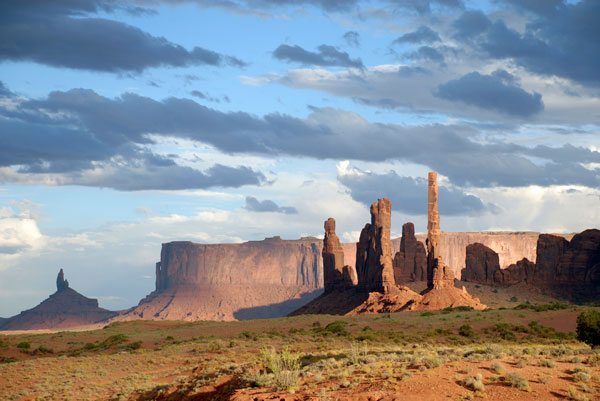“September, 1995 Summary of Legal Victory!”
Administrative Law Court Hearing, Appeal of Peabody’s Kayenta mine permit renewal.
Dineh Alliance vs. Office of Surface Mining Reclamation and Enforcement (OSM) & statutory party Peabody Western Coal Company (PWCC), U.S. District Court House, Flagstaff, AZ.
Many of your e-mailed and mailed public comments on Peabody’s Kayenta mine permit review are part of OSM’s decision document, having been received prior to June 10, 1995 Informal Conference, Forest Lake Chapter House, Navajo Nation. They are also part of the record before the Administrative Law Court. We received comments from around the world. Many thanks. –Dine’ Alliance
LEGAL VICTORY AT HAND
Black Mesa residents were impressed by Administrative Law Judge Ramon M. Child, who presided in the hearing on Peabody Coal Company’s Kayenta mine permit. The Dineh feel the judge really listened to them as they took the witness stand and presented their testimonies. The hearing lasted for five days, going each day to 8 or 9 pm, with an unusual Saturday session to conclude the proceedings. The judge on numerous occasions lent his own firepower to Dineh lay counsel Marsha Monestersky and lay co-counsel and translator Louise Benally to ask questions and continue investigation of particular issues.
When the Peabody attorney, Mr. Bird, asked the judge to throw out our case alleging a lack of prima facie evidence, Judge Child replied “No, Mr. Bird, I feel that there is evidence. But Mr. Bird, you’d better prepare your case, as I just might shut Peabody down”. The judge heard testimonies by Black Mesa residents about how the Navajo Nation has ignored and neglected them. And this was confirmed by Marvin J. Smith, Director, Division of Natural Resources, Navajo Nation, who under oath stated he had not conducted any site visits to homes or investigated any environmental concerns in the five years he served as director. The judge opened the court on Saturday by asking for Marvin J. Smith to appear from the day before. When the Peabody attorney stated that Smith was no longer there, Judge Child stated “I never excused Marvin J. Smith. That’s too bad. I did not sleep last night, thinking about Marvin J. Smith and the Navajo Nation. And I want to tell Marvin J. Smith and the Navajo Nation what I think of them. I think the Navajo Nation is making profits while the residents of Black Mesa are suffering”.
At the close of the hearing, the residents declared victory, as they spoke in Dineh, with translation by community members. “More has happened in the last five days than has happened in the last twenty years”. It was because a judge had finally listened to them.
Dine Alliance requests: that by law the OSM decision to issue Peabody’s Kayenta mining permit be set aside, and that a temporary restraining order be immediately issued against Peabody Coal Company in any further mining operations on Black Mesa.
WHY THE KAYENTA MINING PERMIT
SHOULD BE REVOKED
Lawyers representing Peabody, a subsidiary of Hanson Holding Company, London, England, relying on teams of lawyers from Washington, D.C., and with considerable assistance by OSM, must not be allowed to keep the mine operating, as it causes imminent harm to the people, land, air, and water resources on Black Mesa, Navajo Nation, Arizona.
OSM legally erred in renewing the Kayenta Mine permit. Issuance of this permit violates all applicable statutes, and unless the Kayenta Mine permit is rescinded, it constitutes criminal activity by OSM and a violation of residents civil, human and constitutional rights, as well as unethical behavior. We demand equal enforcement and applicability of all state and federal laws regarding adequate hearing notice and enforcement practices on native lands.
No permit can be issued without proper and legally valid reclamation bonds, including, but not limited to slurry pipelines and railroads. It must also be demonstrated that OSM inspectors are given the freedom to perform their job and enforce mining regulations before permit issuance, until proper air quality monitoring is done for dust/particulates/selenium occurs, and until all allegations set forth by the Dineh Alliance have been adequately investigated, and all concerns adequately resolved.
OUR STRUGGLE – WHERE WE ARE NOW
The court has heard the voice of Black Mesa region of the Navajo Nation. For five days traditional elders and residents, with no change of clothes, eating one meal a day, and without legal representation, presented their case. Some residents slept in their cars and camped out in the cold and rain.
Peabody Coal Company is desperate. The Kayenta mine permit renewal is illegal. Twelve (12) outstanding violations are still unresolved. A new, highly controversial coal mining method (Highwall Side Overburden Mining) is being considered without the required Environmental Impact Statement (EIS). The unpermitted railroad continues to operate in violation of applicable federal regulations, with no reclamation bond money posted for it or the Kayenta mine site. The unpermitted and illegal slurry pipeline continues to pump over 1.3 billion gallons of pristine water annually. The unpermitted and illegal slurry pipeline continues to operate under Administrative Block, pending no continued use of the Navajo aquifer by the Hopi Tribal Council, past their permit expiration. Hopi Tribal Council Studies documents have determined that at the present rate of usage, water sources in Tuba City and surrounding communities will run dry in fifteen years. The Navajo aquifer is a sole source aquifer for the Hopi and Navajo. Burial sites of the Dineh people continue to be desecrated and human remains bulldozed by Peabody.
The U.S. Office of Surface Mining Reclamation and Enforcement continues to get awards for doing nothing to resolve Citizens Complaints yet it could not determine the status of current violations, (all are under appeal),under oath answering, “I don’t know” to specific questions. It seems OSMRE exists to keep non-compliant coal companies afloat with the creation of it’s “Green File”, a dual filing system. Trust Responsibility does not apply to the Dineh people on Black Mesa, AZ. Environmental injustice is a reality.
At the close of day three, while still in the courtroom, Jon Johnson, senior attorney for the Solicitor’s Office, Denver, stated “I believe it’s appropriate at this time for C-4’s and automatic weapons”. It had a chilling effect on the Black Mesa residents who brought the matter to the judge immediately. A police report was filed and a U.S. Marshall was posted in the courtroom for the remainder of the hearing.
In reference to testimony of illnesses in livestock and human health, Administrative Law Judge Ramon Child asked OSMRE “Do you mean that you have allowed mining to go on in face of it?” OSMRE replied “Yes”.
A Hopi elder told Judge Child “There is no land dispute between traditional Hopi and Dineh people.” John S. Boyden, who was an Attorney for PWCC and the Hopi Trial Council concurrently, negotiated the original leases between both parties illegally. The traditional Dineh vow to never surrender to the rape and desecration of Mother Earth caused by PWCC on their ancestral lands.
We believe we have a chance to win in this court and in any other court. We have accumulated an impressive amount of evidence against both Peabody Coal Company and Office of Surface Mining (OSM), filed over 300 Citizens Complaints since October, 1993, and have Notice of Violations (NOV’s) cited against Peabody for these complaints. OSM test results show toxic contamination in springs and wells.
Excerpts from the Denver OSM Hydrology report, dated April 17, 1995, submitted to the court states: “OSM Water Quality Reports identify the likely source of recharge to the Benally spring as the Black Mesa Pipeline Facility”. Yet no monitoring wells are located in close proximity to the Black Mesa pipeline operations. “Infiltration of process water at the Black Mesa pipeline facilities area has been suggested as a source of the recharge to the Benally spring”. This facility pumps over 1.3 billion gallons of pristine Navajo aquifer each year, with over 26 billion gallons already pumped, travels over 275 miles, is illegal, unpermitted, leaking, and no environmental impact was ever done. Two unlined coal stockpiles at this location since about 1970, are identified as a source of high sulfate and acidity to infiltration in the area, with high concentrations of dissolved manganese and boron noted in water quality data”. Yet the Benally Springs not identified during the permitting process and therefore, no baseline information is available. “OSM water test results confirm several chemical parameters that are high and exceed Arizona water quality standards including excesses in magnesium, sodium, nitrate, manganese, boron”. The Benally Spring was used as a livestock watering source for 25 years until OSM notified complainants not to have the livestock drink the water”. It is recommended that certain areas be checked, yet no field monitoring was done. Peabody’s Black Mesa/Kayenta mining operations are joined and covers 103 square miles.
During the EIS process the EPA voiced class III objections (the strongest) against the use of a slurry pipeline, noting hydrological concerns, including drawdown effects on the Navajo aquifer. Yet, no action was taken. The EPA wrote weak permits for Peabody’s Black Mesa/Kayenta mine. WE DEMAND the EPA write enforceable permits on Peabody’s Black Mesa/Kayenta mine.
WE NEED ENFORCEABLE LIMITS SET FOR TOXIC CHEMICALS in NPDES permits, including, but not limited to arsenic, magnesium, manganese, nitrates, sulfates, selenium and boron. These standards need to be promulgated, whether the Navajo Nation EPA promulgates them not or not. These standards have never been set in the past by the U.S. EPA, which has by their action/lack of action demonstrated an egregious selling out of native lands. WE NEED PERMITS WITH ENFORCEABLE STANDARDS set so that monitoring can take place. Without monitoring enforcement is impossible.
WE NEED WELL AND SPRING MONITORING at specific locations to monitor aquifer diminution and contamination. WE NEED MONITORING BY THE BLACK MESA PIPELINE FACILITIES and by the coal stockpiles to ensure no leachades. WE NEED TESTING to occur where citizens have complained about contaminated water.
Recently we were awarded an environmental justice grant from U.S. EPA to conduct an Environmental Health Assessment Survey in the mine permit area, and establish a cellular/radio phone communications system. We hope to establish Internet access in Big Mountain.
On Day 2 Judge Child told the court that he had several faxes awaiting for him at the hotel prior to the start of the hearing. The judge then asked the court how people in London knew. Jon Johnson, Senior Attorney, Solicitor’s Office, Denver, CO, replied in a low somber voice: “Internet, your Honor,” after which Dineh Alliance replied “It was smoke signals, your Honor.” The court erupted in laughter.
HOW YOU CAN HELP
An Administrative Law Court is a difficult court to win in. Issues that we don’t win in this court, we hope to bring to Federal District Court, which gives us a wider latitude to conduct discovery, obtain depositions, supeona witnesses, etc.
WE NEED YOUR SUPPORT with prayers, by sending e-mail, faxes, letters to the U.S. EPA, who together with OSM has jurisdiction and trust responsibility for Native lands. EPA must exercise their jurisdiction, investigate our concerns, and address the inadequacies in the extremely weak permits they issued for Peabody’s Black Mesa/Kayenta mine. We need enforceable limits for toxins written into the permit.
WE NEED FUNDS to pay for legal expenses, court transcripts, xeroxing, and faxes. To obtain phone/fax/e-mail access in a remote area, we need an IBM compatible 486 computer or laptop computer, high speed modem, satellite dish, and technical help to advise us get the right equipment. We have an office, and need word processing software for donated IBM compatible 386 and 286, so local residents can become trained in the use of computers.
Because residents live a traditional subsistence lifestyle, sheep herding and weaving, WE NEED MONEY for travel for the elders and residents to attend court hearings, gas and food while on travel.
Tax deductible contributions can be sent to Dineh Alliance’s fiscal agent, Don’t Waste Arizona, Inc. Please address checks: Don’t Waste Arizona Inc., on memo portion of check note: for Black Mesa Legal Fund. Don’t Waste Arizona, Inc., 6205 S. 12th Street, Phoenix, AZ 85040. Please write Dineh Alliance, Box 810, Pinon, AZ 86510 for more information, newspaper articles, and if you want to help.
For more information contact:
Dineh Alliance
c/o Louise Benally, President
Box 810, Pinon, AZ 86510
E-mail: dineh@primenet.com
Thank you for your support, please spread the word,
for peace and environmental justice. –Dine’ Alliance
SAMPLE SUPPORT LETTER
Please send mail to:
Ms. Carol Browner, Administrator
United States Environmental Protection Agency
401 M Street, SW
Washington, DC 20460
Ms. Carolyn Douglas, Project Manager
U.S. Environmental Protection Agency
Region IX (E-4)
75 Hawthorne Street
San Francisco, CA 94105-3901
Ms. Elizabeth Bell
Office of Environmental Justice
U.S. Environmental Protection Agency
401 M Street S.W. (3103)
Washington, DC 20460
Bell.Elizabeth@EPAMAIL.EPA.GOV
Ms. Lori Lewis
Office of Environmental Justice
U.S. Environmental Protection Agency
Region IX (E-4)
75 Hawthorne Street
San Francisco, CA 94105-3901
Dear Administrator Browner, Ms. Douglas, Ms. Bell, Ms. Lewis,
The Black Mesa issue is the first case of environmental justice brought by Native American people to the executive branch of the United States government since President Clinton issued Executive Order 12898 on Environmental Justice, February 11, 1994. This Executive Order directs all federal agencies to focus on protecting environmental and human health in low-income and minority communities and to give the residents access to public information and the chance to take part in decisions about their environment and health. And while Executive Order 12898 is not legally binding and is not enforceable, it indicates a recognition and intent by the U.S. government to resolve problems with disproportionate contamination on lands belonging to people of color. The United States Environmental Protection Agency (EPA), every federal agency and the federal government must fulfill their environmental and trust responsibility to the residents of Black Mesa. These people are under siege. Protection of the environment is a fundamental human right, not a civil right.
The United States Environmental Protection Agency (EPA), during the Environmental Impact Statement (EIS) process, voiced Class III objections (the strongest), against use of a slurry pipeline, noting hydrological concerns, including drawdown effects on the Navajo aquifer. Yet, no action was taken.
The U.S. EPA wrote weak permits for Peabody’s Black Mesa/Kayenta mine. We demand that the U.S. EPA write enforceable permits on Peabody Coal Company’s Black mesa/Kayenta mine.
We need enforceable limits set for toxic chemicals in NPDES permits, including, but not limited to, arsenic, magnesium, manganese, nitrates, sulfates, selenium, and boron.
These standards need to be promulgated, whether Navajo Nation EPA promulgates them or not. These standards have never been set in the past by the EPA. The U.S. EPA has by their action/lack of action demonstrated a egregious selling out of Native lands. We need permits with enforceable standards set so that monitoring can take place. Without monitoring, enforcement is impossible.
We also need well and spring monitoring at specified locations to monitor aquifer diminution and contamination. We need monitoring by the Black Mesa pipeline facilities and by the coal stockpiles to ensure no leachades. We need testing to occur where Citizens have complained about contaminated water.
EPA’s Multi-Media/Multi-Agency Task Force, while a historic precedent by which federal and tribal agencies came together to investigate environmental concerns, produced a report, with many of the serious issues still under investigation, and no follow-up conducted. EPA has tested only the deep N-aquifer water, not the surrounding surface or near surface water that are impacting livestock. This Task Force was specifically asked by Black Mesa residents to test this water. To date nothing has happened, and many Citizens Complaints remain unresolved years later.
We understand that a Superfund investigation has begun of Peabody, called by U.S. EPA, Region IX. We hope that all chemical parameters identified and available are included in Superfund investigation parameters. Local residents must be able to effectively participate in all investigations conducted to ensure the proper sites and specific concerns of Black Mesa area residents are adequately addressed.
During the Administrative hearing the Judge invited Dineh Alliance to Intervene on a case before his court. The issue is excessive stripping distances. Peabody has been stripping the land 8-10 years in advance of mining activities.
Due to substantial air quality concerns resulting from mining operations and excessive stripping distances, it is imperative that air quality monitoring stations at both the Black Mesa and Kayenta mines be relocated to the valleys, near residents’ homes and by the coal stock piles. Air quality monitoring stations must be upgraded to monitor for particulates in addition to coal dust, and when possible continuous monitoring should take place. Monitors should be well maintained and checked frequently for effectiveness, considering air current patterns, seasonal variations, and should be down-wind and not up-wind from mining operations. Please ensure that Black Mesa residents are allowed the right to participate in locations, sites chosen. They are directly affected.
Please exercise your trust responsibility for the residents of Black Mesa living in the coal fields.







